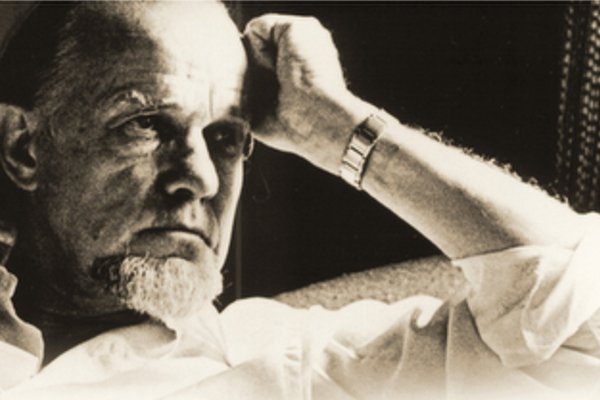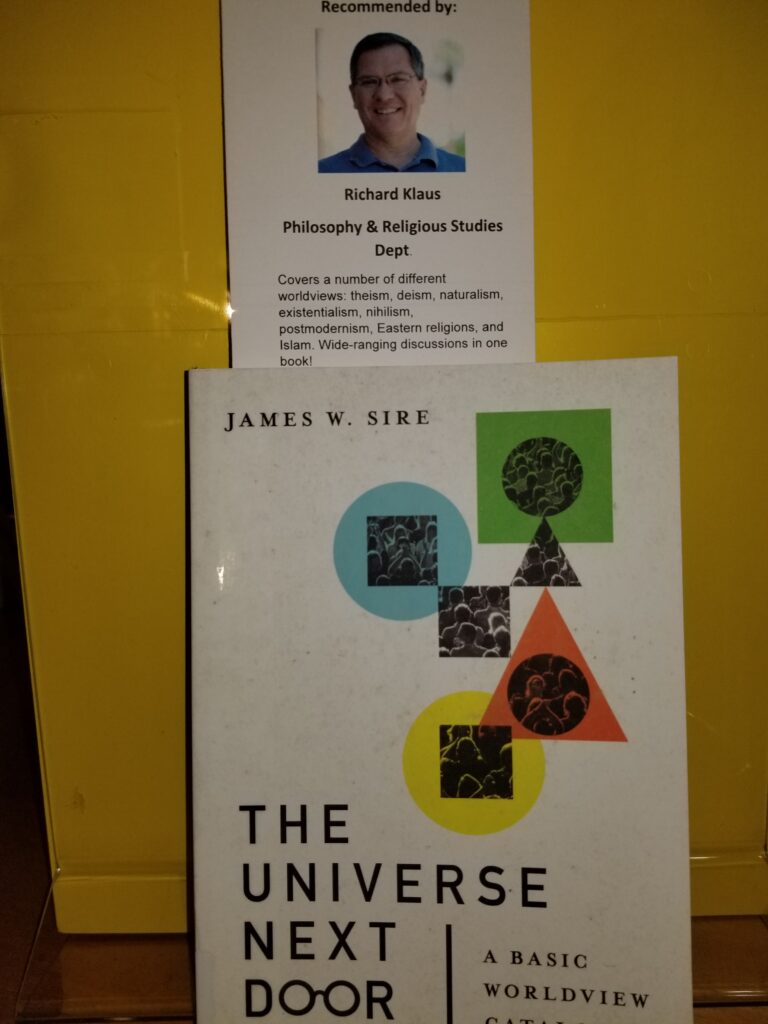It has been nearly thirty-five years since I took my first philosophy class here at GCC! I was fresh out of high school (go Deer Valley Sky Hawks!) and was excited to pursue a path studying philosophy with the hopes of eventually teaching in the discipline. (As an aside, my very first philosophy class was with longtime GCC professor Bob Hubbard who recently passed away.) Now, being able to teach our students in the Introduction to Philosophy class (PHI 101) that I took so many years ago is amazing! I find there are some direct continuities between the concepts I learned over three decades ago and the ones I teach today in my classes.
In my last year of high school, I was exposed to the thought of Francis Schaeffer. As a thinker he taught me to consider the concept of an integrated worldview. A picture of Schaeffer hangs in my office as a tribute to his role as a doorman to the larger world of ideas.
Around this time, I also read James Sire’s book The Universe Next Door: A Basic Worldview Catalog which further encouraged my approach to philosophy in terms of comparing and contrasting various worldviews. It is this worldview approach that has set the trajectory for my thinking and teaching. I recently participated in the GCC library’s “suggest-a-book” promotion, and I suggested Sire’s The Universe Next Door (now in the sixth edition).
During the first week of class, I explain the concept of a worldview using a worldview triangle where each point is marked by the one of the key worldview elements: Metaphysics, Epistemology, and Ethics. I also have them consider the eight worldview questions utilized by Sire:
i. What is prime reality—the really real?
ii. What is the nature of external reality, that is, the world around us?
iii. What is a human being?
iv. What happens to a person at death?
v. Why is it possible to know anything at all?
vi. How do we know what is right and wrong?
vii. What is the meaning of human history?
viii. What personal, life-orienting core commitments are consistent with this worldview?
I want students to come away from my philosophy class seeing not only the depth and breadth of great thinkers and their ideas but also the very real practicality of how a worldview functions in their lives and our culture. In order to reinforce this, I write two things on the board every class period. One is the worldview triangle, and the other is the statement, “Ideas have consequences, some bad ideas have victims!” This is to remind the students that the study of philosophy is not about the arcane or irrelevant (okay… some of it is!) but, rather, about ideas that move cultures and societies. In order to show how this is the case I use the essay by Ashley Fernandes “Why Did So Many Doctors Become Nazis?”
Fernandes notes how doctors and nurses joined the Nazi party in Germany in greater numbers than other professions. She writes:
“It is worthy of emphasis that although many professions (including law) were “taken in” by Nazi philosophy, doctors and nurses had a peculiarly strong attraction to it. Robert N. Proctor (1988) notes that physicians joined the Nazi party in droves (nearly 50% by 1945), much higher than any other profession. Physicians were seven times more likely to join the SS than other employed German males. Nurses were also major collaborators. The Holocaust should be studied by every health care professional as a reminder of how sacred the substance of our craft is, and what the consequences may be if we forget the dignity of persons again.”
Fernandes shows how good people in a discipline committed to healthcare could become attracted to bad ideas and subsequently lend their hand to evil atrocities. I read large sections of this essay to the students in my classes to show the very real-world effects that bad ideas can have when they take root in a culture.
Throughout the semester I continue to stress this dynamic of philosophical ideas and how they come to expression in our own culture. At times the students can think that studying Plato and Aristotle can seem out of touch with their lives. One way I attempt to show the ongoing relevance is that these ancient thinkers’ ideas continue to pulsate through our culture—either as ideas to follow or to overthrow. I try to demonstrate that beneath all the culture war battles that take place in our time there are underlying philosophical ideas at play. Many times, we simply stay on the surface of cantankerous disagreement that often degenerates in shouting matches. But beneath all these cultural hot spots there is first a philosophical disagreement. Understanding the philosophical categories may help them navigate these cultural debates in a more reasoned manner.
I love philosophy and teaching philosophy. The ideas that ignited in me a passion to think and articulate an integrated worldview continue to motivate me to see others grasp the beauty and rationality of clear thinking. If in some small way I can contribute to the opening of minds to larger vistas of thinking and reasoning, then I can count my endeavors a success.


